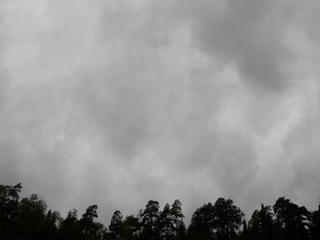
Karl Ove Knausgård:
”Ute Av Verden”, Karl Ove Knausgård (1998, Tiden Norsk Forlag, Oslo)
Because the world is old - in Norwegian:
”Og vi? Vi hever blikket og ser på stjernene. Vi lar oss bevege av dette lyset som har brukt flere hundre år på å komme hit, dette forhistoriske lyset som har blitt kjøligere og kjøligere på sin reise gjennom verdensrommet og som når oss dødt og kaldt. Som alt som når oss fra fortiden er dødt og kaldt. For verden er gammel. Men livet er ungt og tiden et barn bøyd over sine brikker. Leende sitter han der og leker, barnekongen. Uten en eneste bekymring flytter han på brikkene sine, av og til går han lei og dunker dem irritert mot brettet, kanskje feier han alt bort for å begynne på nytt og igjen la seg oppsluke. Han husker ikke hva som hendte i går og bryr seg ikke om hva som vil hende i morgen. Han leker, han pludrer, han er fornøyd. Det er vi som er bekymret".
s. 175, ”Ute Av Verden”, Karl Ove Knausgård (1998, Tiden Norsk Forlag, Oslo)
---
For verden er gammel - på Engelsk:
”And what about us? Raising our eyes, looking at the stars. We inhale this light that has travelled hundred of years to arrive, here, this pre-historic light that has cooled and lessened on its journey through space - and reaches us dead and cold. Just like everything that reaches us from the past is dead and cold. Because the world is old. But life itself is young and time a child hunched over its pieces. Joyfully it sits and plays - the Kid-king. Without hesitation and worry on his mind, he moves his pieces around, occasionally he gets bored and slam them towards the board, or wipe them fretfully away - for then to start all over again in a new, deep concentration. He doesn’t remember what happened yesterday, and he doesn’t care about tomorrow. He plays, he concentrates - he is content. We are the ones who are worried.
(This was my effort to translate this piece of text from Knausgård´s novel. (p 175, Ute Av Verden, 1998, Tiden Norsk Forlag, Oslo). The author, Knausgård himself, has not been involved in this effort, and I take full responsibility for all errors that might have been caused by my endeavours.)
---
MY THOUGHTS ON THE TEXT:
The sentence(s) that I find so beautiful is the following: “For verden er gammel. Men livet er ungt og tiden et barn bøyd over sine brikker”. Furthermore I have tried to translate this piece from K.O. Knausgård, Ute av verden, like this; “Because the world is old. But life itself is young and time a child hunched over its pieces”.
This sequence in his novel (I have yet to finish reading the whole book) moved me. It is hard to explain how this passage, these few words, these mere letters - that were put together in exactly this way affected me in such a way. However, I will try; firstly it is so illustrative. And it is simple, yet inclusive and all-embracing. The words and their meaning put us in place, puts me in a state, in time within time. Sometimes when reading, I lose out on (some of) the words. I haste past them, without really letting them in, and without allowing them their deserved attention. And even if the first third of Knausgård’s story about Henrik Vankel so far has been truely captivating, somewhat unconsciously I had fallen out half way down page 175. My thoughts were elsewhere until this sentence brought me back - actually there are two sentences in question, but if two sentences can belong to each other, these two exemplifies this fact; “Because the world is old” – something we all know this is true, even if we can’t imagine 4,4 billion years, ever!
The five words are not even particularly distinguished (read:noteworthy); not until “But life itself is young and time a child hunched over its pieces” revitalises the preceding sentence. And suddenly I feel somewhat - mapped. I am touched by this – and it makes me feel (perhaps unintentionally) included in history, our history. This, my increasingly feeble effort to explain the way these words affected me, is becoming too sentimental, but I can’t recall a sequence that have overwhelmed me like this.
However, saying that I somehow think about Knut Hamsun and/or Gabriel Garcia Marquez. And yet, even if there might have been parts in their writing that created moments like this, I can’t bring any of these back to the surface right now. Those passages have most likely settled back into the story they belong to. Knausgård’s two sentences on page 175 may eventually also blend back into my closing experience of his book, but somehow I doubt it.
I am genuinely affected.
No comments:
Post a Comment